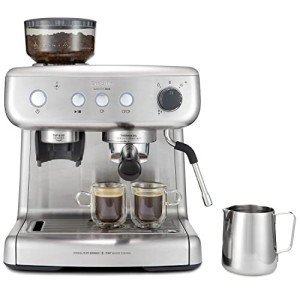The Rise of Home Espresso Machines: A Comprehensive Guide
As coffee enthusiasts continue to look for fresh and flavorful brews in the house, the appeal of home espresso machines has surged in current years. No longer simply the domain of coffee shops and coffee bar, these machines empower individuals to craft barista-quality espresso beverages from the comfort of their cooking areas. This post will explore the numerous kinds of home espresso machines, their functions, and considerations for choosing the best one. Additionally, it will provide a choice of FAQs to help potential buyers make notified decisions.
Types of Home Espresso Machines
Home espresso machines can be categorized into numerous categories based on their systems and user-friendliness. Each type has its special functions, pros, and cons.
| Type | Description | Pros | Cons |
|---|---|---|---|
| Manual Espresso Machines | Needs the user to by hand manage the developing process, involving methods like pulling a lever to create pressure. | - Complete control over brewing procedure - Compact style | - Requires skill and practice - Time-consuming |
| Semi-Automatic Machines | Machine automates water flow and pressure, however the user still controls the dosing and duration of the brewing process. | - Balance of automation and control - Versatile | - Learning curve for refining strategies |
| Fully Automatic Machines | Automates the whole developing process, from grinding to brewing, often with programmable settings for customized drinks. | - Extremely user-friendly - Quick and convenient | - Less control over the developing process - Higher price point |
| Pill or Pod Machines | Uses pre-packaged espresso capsules or pods to create coffee rapidly and quickly. | - Extremely simple to use - Minimal cleanup | - Limited flavor range - More pricey per cup than ground coffee |
| Super-Automatic Machines | Combines features of fully automatic machines with built-in grinders, permitting users to brew whole bean espresso and milk-based drinks with one touch. | - All-in-one benefit - Ideal for milk-based beverages | - Often the most costly - Can be large |
Functions to Consider
When selecting a home espresso machine, possible buyers ought to consider the following features to guarantee they select a machine that satisfies their needs:
Grinder Type:
- Built-in grinders can provide fresher grounds but might need more upkeep.
- Different mills allow for more modification of grind size.
Pressure:
- Look for machines that produce at least nine bars of pressure, which is optimal for brewing espresso.
Water Temperature Control:
- Machines with adjustable temperature level settings permit better extraction of taste from beans.
Milk Frothing Options:
- Consider whether you want a manual steam wand for frothing or an automatic milk frother for benefit.
Ease of Cleaning:
- Machines with removable parts and self-cleaning functions considerably decrease cleanup time.
Size and Design:
- Ensure the machine fits comfortably in your cooking area and aligns with your aesthetic choices.
Budget:
- Set a budget before starting your search, as prices can range considerably from affordable designs to high-end machines.
Benefits of Home Espresso Machines
Owning a home espresso machine offers numerous advantages:
- Cost-Effective: Over time, brewing espresso at home can save coffee lovers money compared to regular café gos to.
- Customization: Users can explore various beans, grind sizes, and brewing techniques to discover their best cup.
- Convenience: The capability to brew espresso whenever eliminates the need to head out to a coffee shop, particularly useful during late nights or early mornings.
- Quality assurance: With a home machine, people have total control over the quality of components and developing procedures.
Disadvantages of Home Espresso Machines
However, there are some downsides to think about:
- Initial Investment: High-quality espresso machines can be pricey, needing a considerable in advance investment.
- Learning Curve: Mastering the art of espresso developing can require time and practice, which might be intimidating for beginners.
- Upkeep: Like any appliance, espresso machines require regular cleansing and upkeep to make sure ideal efficiency.
FAQs
1. What is the best kind of home espresso machine for novices?
Answer: For newbies, a semi-automatic machine is typically advised as it uses a balance between control and automation, allowing you to learn the fundamentals without frustrating complexity.
2. How much should I invest on a home espresso machine?
Response: Entry-level machines can start around ₤ 100 to ₤ 300, while higher-end models can range from ₤ 500 to over ₤ 2000. Espresso Machines Under £200 to set a budget based on your anticipated use and desired functions.
3. Do I require a separate grinder?
Answer: While some espresso machines feature built-in grinders, purchasing a different grinder permits for higher modification and guarantees better quality premises.
4. How often should I clean my espresso machine?
Answer: Cleaning frequency can differ by machine type, however it's generally advised to clean the machine after each use and carry out deep cleanings weekly or month-to-month, depending upon usage.
5. Can I make milk-based beverages with any espresso machine?
Answer: Not all machines feature milk frothing abilities. If you take pleasure in drinks like lattes or coffees, search for a machine with a steam wand or automatic frother.
Home espresso machines are changing the way coffee aficionados enjoy their beloved brews. With various types and advanced functions readily available in the market, there is something for everyone. Whether it's the happiness of producing distinct dishes or just enjoying the perfect shot of espresso, buying a home espresso machine can boost both the coffee-drinking experience and the lifestyle for coffee fans everywhere. As with any financial investment, it is essential to weigh the benefits versus the potential downsides and pick a machine that effortlessly fits both your way of life and preferences.

